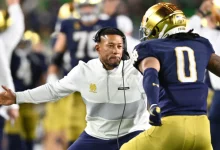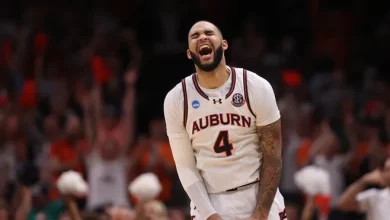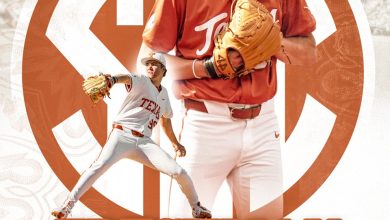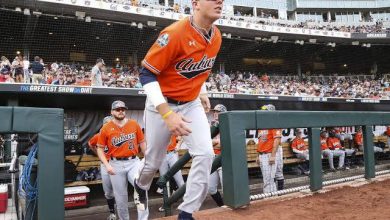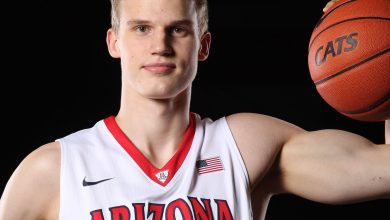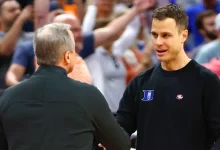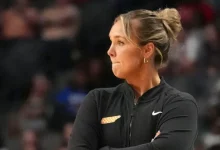Lakers Can’t Afford to Give Up on Dalton Knecht After Acquiring Marcus Smart Amid Intensifying NBA Trade Rumors and Speculation.
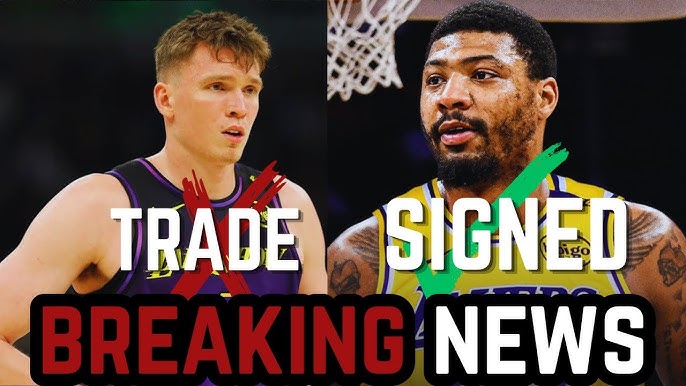
In a summer packed with drama, speculation, and high-profile transactions, the Los Angeles Lakers have made yet another bold move—adding defensive stalwart Marcus Smart in a deal that many see as a pivot toward defensive toughness and veteran leadership. But while the acquisition of Smart addresses some of the Lakers’ short-term playoff ambitions, there’s a looming question that could reshape the franchise’s trajectory: What happens to Dalton Knecht?
The 6-foot-6 rookie out of Tennessee was seen by many as a draft-day steal for the Lakers, a polished scorer with NBA-ready tools and a mentality built for the big stage. But with Los Angeles once again tilting toward a win-now philosophy, there’s growing concern among fans and analysts that Knecht could get lost in the shuffle—or worse, become trade bait in the team’s pursuit of another veteran star.
Let’s be clear: the Lakers cannot afford to give up on Dalton Knecht, not now and certainly not before seeing what he can do with meaningful minutes on the floor. With aging superstars, shifting timelines, and a need for cost-controlled talent, Knecht could be a linchpin for both the present and the future.
Dalton Knecht’s Value in a Shifting Lakers Roster
The Lakers’ front office has made it no secret that it wants to capitalize on what remains of LeBron James’ prime. The addition of Marcus Smart—who brings elite defense, floor leadership, and playoff pedigree—is further proof that Los Angeles is pushing all its chips toward another title run. But with every veteran acquisition comes the risk of stunting a young player’s development.
Dalton Knecht, selected 17th overall in the 2024 NBA Draft, offers something the Lakers desperately need: shot creation and perimeter scoring. In Summer League action, Knecht impressed with his ability to score from all three levels, handle the ball under pressure, and make smart reads—traits that align perfectly with modern NBA wing expectations.
In college, Knecht averaged over 20 points per game and shot nearly 40% from three, demonstrating an elite offensive skill set that could blossom in the right environment. He’s not a raw project. He’s a contributor-in-waiting.
Why Marcus Smart’s Arrival Shouldn’t Spell Doom for Knecht
At first glance, Marcus Smart’s arrival might look like a roadblock for Knecht. Both play in the backcourt. Both are expected to compete for minutes. But in reality, Smart and Knecht offer complementary skill sets that could actually thrive together.
Smart excels on defense, often guarding the opposing team’s best player, disrupting offenses, and bringing relentless energy. Knecht, meanwhile, is more offense-oriented, with the tools to spread the floor and score in bunches. A lineup that includes both Smart and Knecht provides the Lakers with a balanced blend of grit and scoring—a vital combination in today’s NBA.
Moreover, Smart’s veteran presence could accelerate Knecht’s development. The rookie doesn’t need to dominate possessions or carry the offense. He needs reps, guidance, and a role. With Smart handling the tougher defensive assignments and facilitating the offense, Knecht could slot into the perfect learning curve without overwhelming pressure.
Lakers’ Cap Situation and the Importance of Cost-Controlled Talent
One of the least talked-about, but most important, aspects of building a contender around LeBron and Anthony Davis is cap management. The Lakers are operating close to the luxury tax line, with limited flexibility to add big-name free agents without gutting their roster. That’s why rookies on controlled contracts are so valuable.
Dalton Knecht is set to earn roughly $4 million per year over his rookie deal—a bargain if he develops into a starting-caliber wing. With LeBron likely playing on a year-to-year basis and Davis requiring help on both ends of the floor, keeping Knecht and investing in his growth is the fiscally and competitively responsible move.
Veterans cost money. Rookies cost patience. In a cap-constrained league, the latter often yields a better long-term return.
The Dangers of “Win-Now or Bust” Thinking
There’s no denying the Lakers are chasing titles while LeBron is still wearing purple and gold. That urgency is understandable. But as other franchises have learned the hard way—think Brooklyn with James Harden, or Phoenix with the aging Kevin Durant core—mortgaging the future for a short-term window rarely ends well.
Dalton Knecht isn’t just another young player; he’s arguably the most NBA-ready rookie the Lakers have had since Kyle Kuzma. Giving up on him too early could be a mistake the franchise regrets for years. With Smart, Reaves, and Davis capable of carrying the heavier two-way load, Knecht should be afforded the opportunity to learn, develop, and contribute.
Trade Rumors: Knecht’s Name Surfaces
With the trade rumor mill churning at full speed, Knecht’s name has already begun to surface in potential packages—especially those involving a third star to complement LeBron and AD. Teams see Knecht as a valuable asset, a plug-and-play shooter with upside and maturity.
But this is precisely why the Lakers should keep him.
It’s not just about what Knecht can do now—it’s what he could become. Imagine a year or two from now, with LeBron either retired or playing a reduced role. Davis remains the centerpiece, and you need scoring wings who can take over games. That’s the long-term vision where Knecht becomes essential.
What the Lakers Need to Do Now
-
Commit to a Defined Role for Knecht
The coaching staff must find a consistent role for Knecht in the rotation. Whether it’s as a spark off the bench or a low-usage starter spacing the floor, he needs real minutes to develop chemistry and confidence. -
Pair Him Strategically with Veterans
Lineups featuring Smart, Davis, and Knecht could offer balance. The rookie doesn’t need to be the focal point—he just needs to get reps alongside experienced teammates. -
Shut Down Trade Talk—Publicly
Rob Pelinka and the front office should signal their commitment to Knecht. A clear public stance could ease speculation and help the rookie focus on the season ahead. -
Lean Into the Dual Timeline
It’s possible to contend now while building for later. The Denver Nuggets did it with Jamal Murray. The Warriors did it with Jordan Poole (at least until that soured). The Celtics have perfected the model. So can the Lakers—if they don’t bail too soon.
In the end, Dalton Knecht represents more than just another first-round pick. He’s a bridge between two eras of Lakers basketball. One foot in the twilight of LeBron’s career, the other planted firmly in whatever comes next. And with Marcus Smart now aboard, the opportunity to mold Knecht into a dependable two-way contributor has never been more clear.
To give up on that—especially for a questionable short-term gain—would be a disservice to both the player and the franchise’s future. In a league driven by stars and sustained by smart team-building, the Lakers must resist the urge to chase flash over foundation.
Dalton Knecht deserves a chance. The Lakers can’t afford to miss on him.


